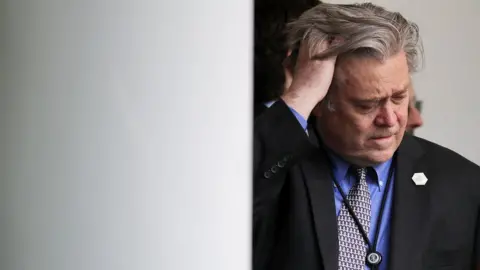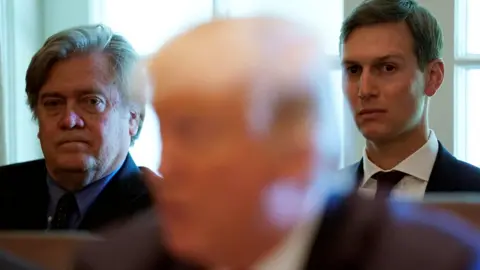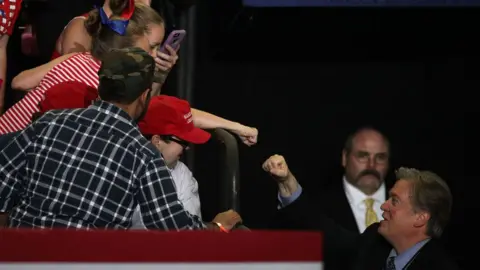Steve Bannon: Trump fuels speculation on top aide's future
 Getty Images
Getty Images"We'll see" - with two words President Donald Trump has shovelled grist into Washington DC's rumour mill, which is filled with chatter that White House chief strategist Steve Bannon is a marked man. The so-called Trump whisperer has proved himself one of the administration's great survivors - so far.
Steve Bannon, the chief White House strategist, is Death warmed up.
By that I mean the characterisation of him by the US comedy circuit - literally as "Death" - is in stark contrast to the persona he projects when you meet him privately.
He's full of surprises, and he has an infectious laugh. I've spoken with him on a number of occasions over the past few months.
We've chatted about Nigel Farage, who led the Brexit campaign in the UK, and a variety of other topics: he doesn't drink, as I learned. He likes English tea ("a cuppa," he says).
Still, he has a wicked reputation - and has frequently been cast as a malevolent force in the West Wing by those outside of the administration and by insiders, too.
The anti-Bannon contingent includes Rupert Murdoch, the Fox News founder who's repeatedly lobbied the president, according to the New York Times, for the strategist to be sacked.
At a news conference in New York on Tuesday, President Trump was asked whether he had confidence in Mr Bannon.
And his tepid answer can't have been very reassuring to the White House chief strategist.
"I like him," said the president. "He's a good man, he's not a racist, I can tell you that.
"He's a good person. He actually gets a very unfair press in that regard.
"But we'll see what happens with Mr Bannon."
Other White House officials are watching as closely as everyone else.
One of the president's aides has previously told me in a despairing tone that Mr Bannon supported the "deconstruction of the administrative state".
The aide looked at me as if to say: how do you work with someone like that?
Mr Bannon pushed hard for the dismantling of the system and the trashing of the elites.
He argued that this unconventional approach was the best way to improve economic conditions and employment prospects for ordinary working people in the US, the voters who helped propel Mr Trump into the White House.
 Reuters
ReutersMr Bannon sees the world in stark terms.
He has been a strong proponent of the America First agenda, along with stricter border and immigration policies.
The power structure at the White House has been constantly changing, but Mr Bannon was a key player in the administration from the beginning and has influenced the president on these policies in a significant manner.
Mr Bannon has apparently been at odds with so-called moderates in the administration, a group that includes the president's son-in-law, Jared Kushner, a senior adviser, and Gary Cohn, the director of the national economic council, both of whom want to take a more measured approach to changing the government.
In contrast, Mr Bannon has pushed for upheaval.
He kept a whiteboard in his West Wing office, covered in scribbled-out goals such as "Suspend immigration from terror prone regions".
He was known for the way that he trashed the press, telling reporters they had been "humiliated" by the Democratic defeat in the autumn, and he encouraged the president to demonise the media.
He's also been accused of encouraging or at least tolerating racist, nationalist views among those who make up the president's base of support.
Mr Bannon's ideological leanings are nothing new.
He supported radical political reform while he was the head of Breitbart News, a website he described as a "platform for the alt-right", a movement that included the Ku Klux Klan and other white nationalist groups.
He pushed for the same agenda while he was working on Mr Trump's presidential campaign.
Mr Bannon has millions of admirers, people who see the world in the way he does and also want to wreak havoc on the Washington establishment.
 Getty Images
Getty ImagesOne of the most important ones is Rebekah Mercer. The daughter of a New York investor, Robert Mercer, she has known Mr Bannon for years and helped to fund his enterprises.
Robert Mercer, as the New Yorker's Jane Mayer has documented, is an enigmatic libertarian and a key force behind Mr Trump's victory.
Mr Bannon revelled in the populist uprising of Mr Trump and continued to stir things up after he won.
At a rally for the president in Melbourne, Florida, in February, Mr Bannon looked on the crowd with a smile.
He is polite (he's from the South) and charismatic, and White House aides have invariably tended to gravitate towards him.
Reince Priebus, the former White House chief of staff, used to bound up to Mr Bannon in a crowd, as if he were afraid he might miss something.
A bear of a man, Mr Bannon looked rumpled when he travelled with the president, and he'd often smooth down his hair with his hand, trying to make himself more presentable.
Still his hair always looked messy.
Once we were supposed to meet in the West Wing at night. It was after 10pm on a Friday, and I waited outside the building.
The place was quiet, and the lights from the building cast strange shadows on the ground. As it turned out, he worked late into the night ("still grinding," he texted me) and then, House-of-Cards style, disappeared into the darkness.
It's not clear whether Mr Bannon will ever be sacked. It's also not certain what the impact of his departure would be on the administration.
He could marshal the dark forces of the internet and his Breitbart audience, swinging a wrecking ball at the Trump presidency.
Some analysts believe the president will keep Mr Bannon at the White House because he's afraid that he'd do too much damage if he were thrown out.
But there are other possibilities: if he left the White House on good terms, Mr Bannon could go back to Breitbart and push for policy changes in the administration from a strong position in the conservative media.
Or he could simply disappear into the night, as I've seen him do in the past.
